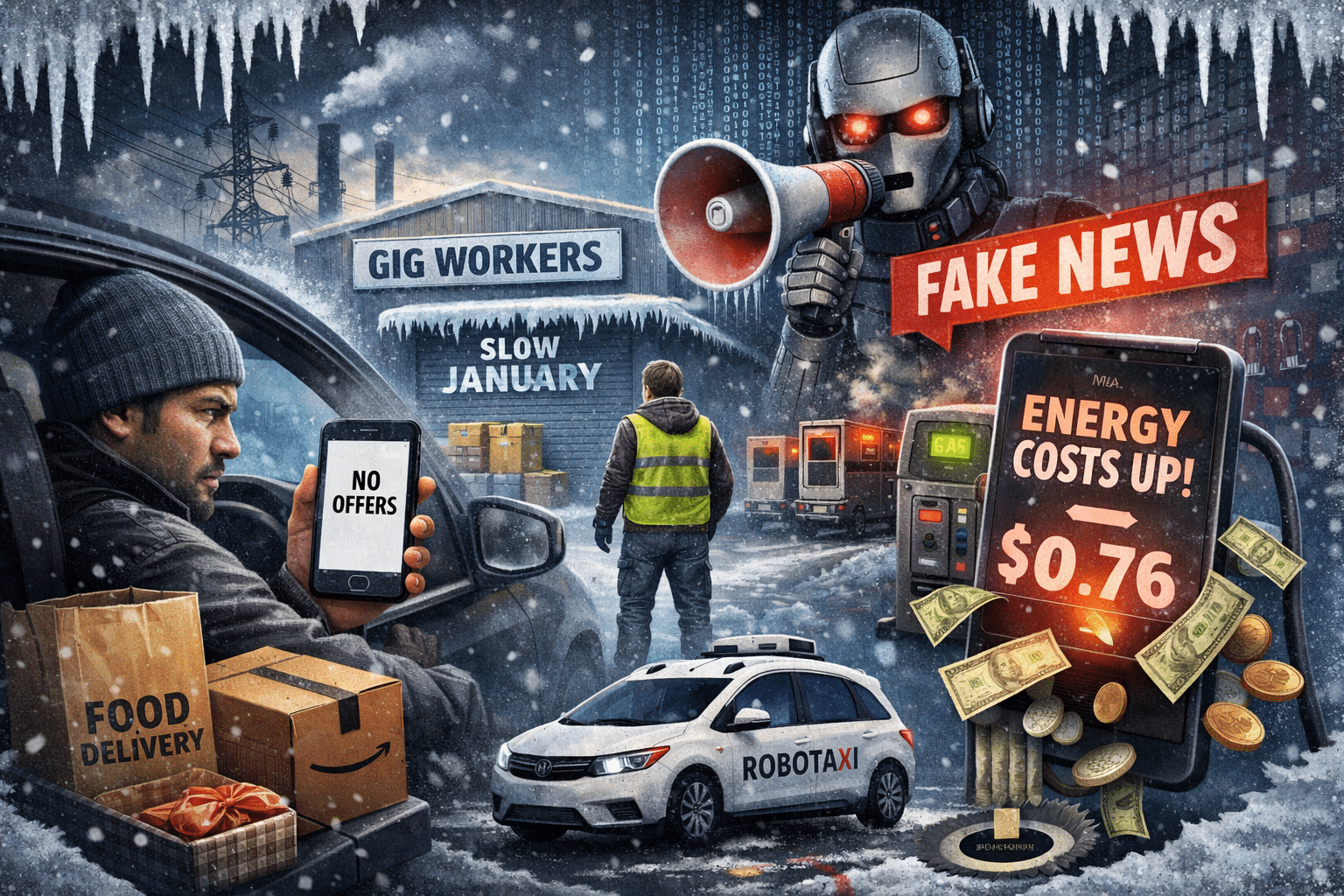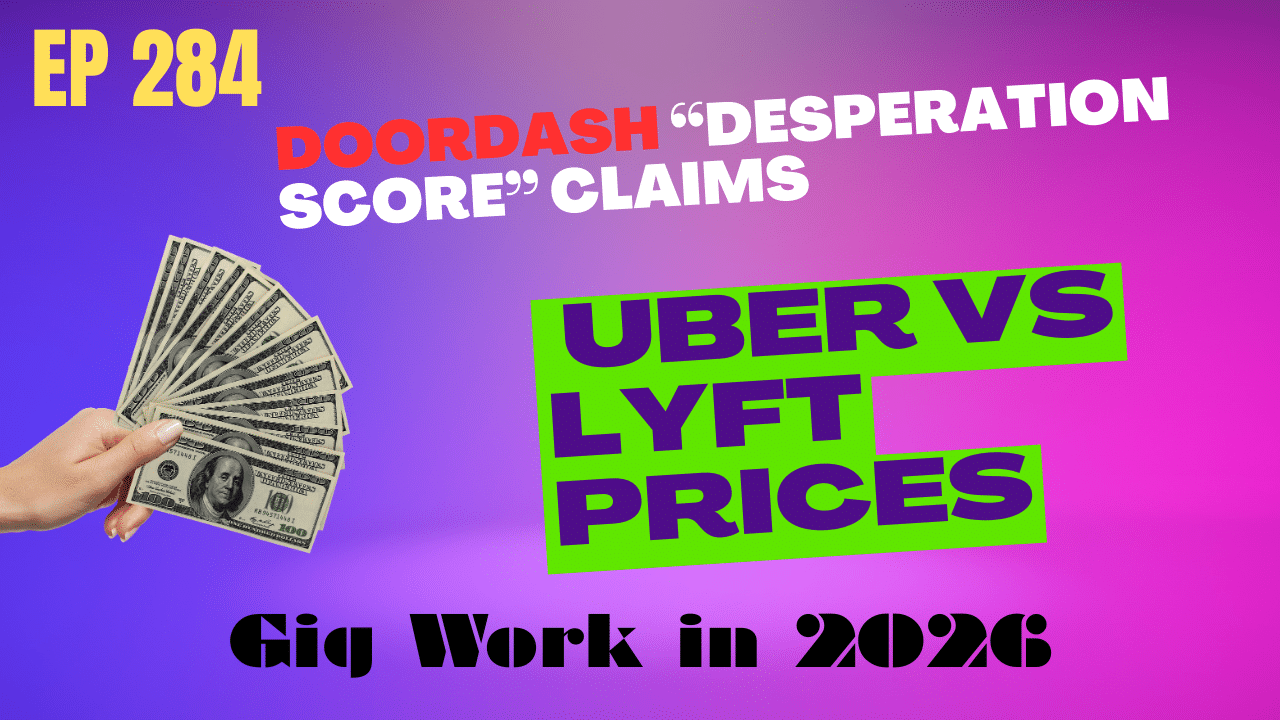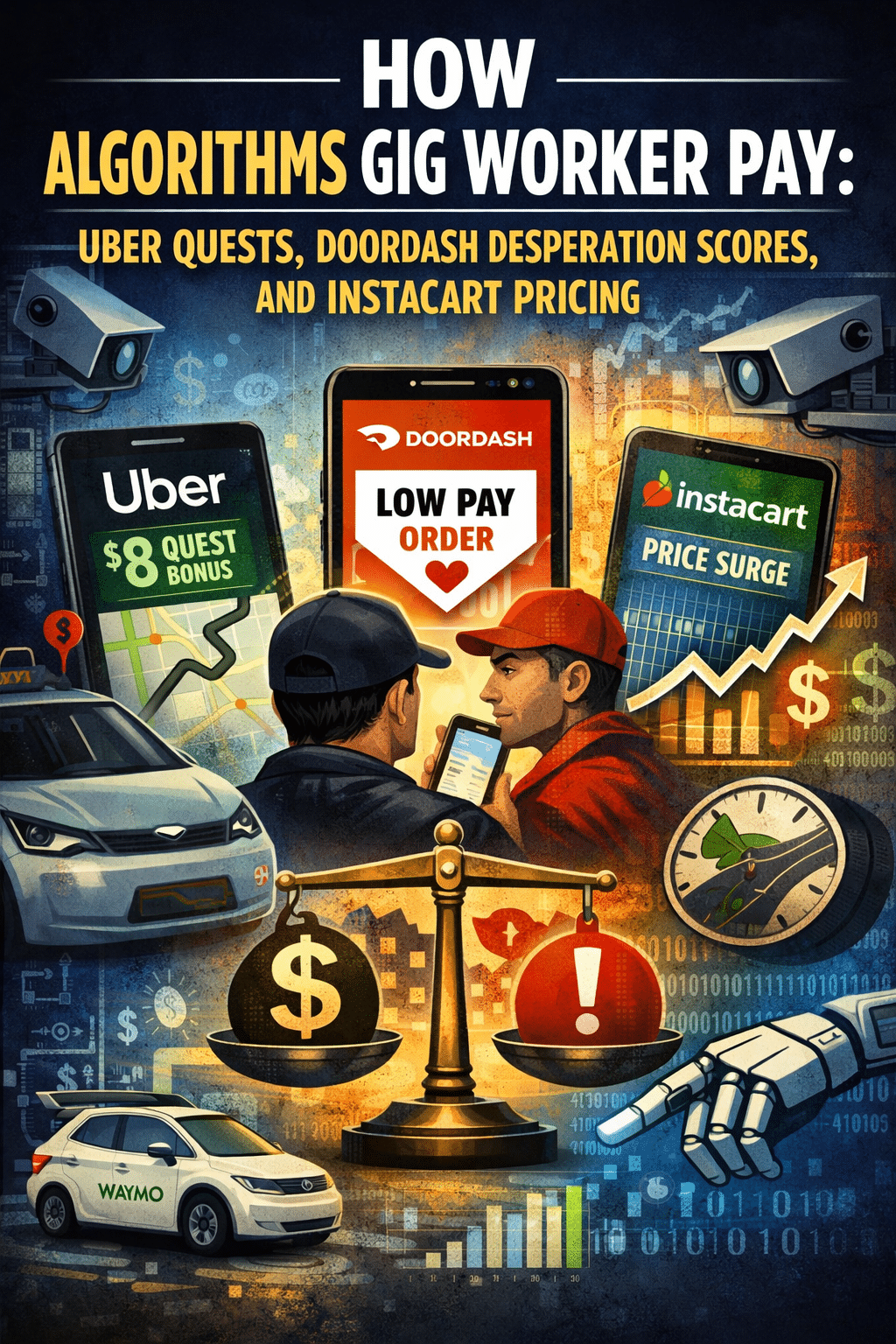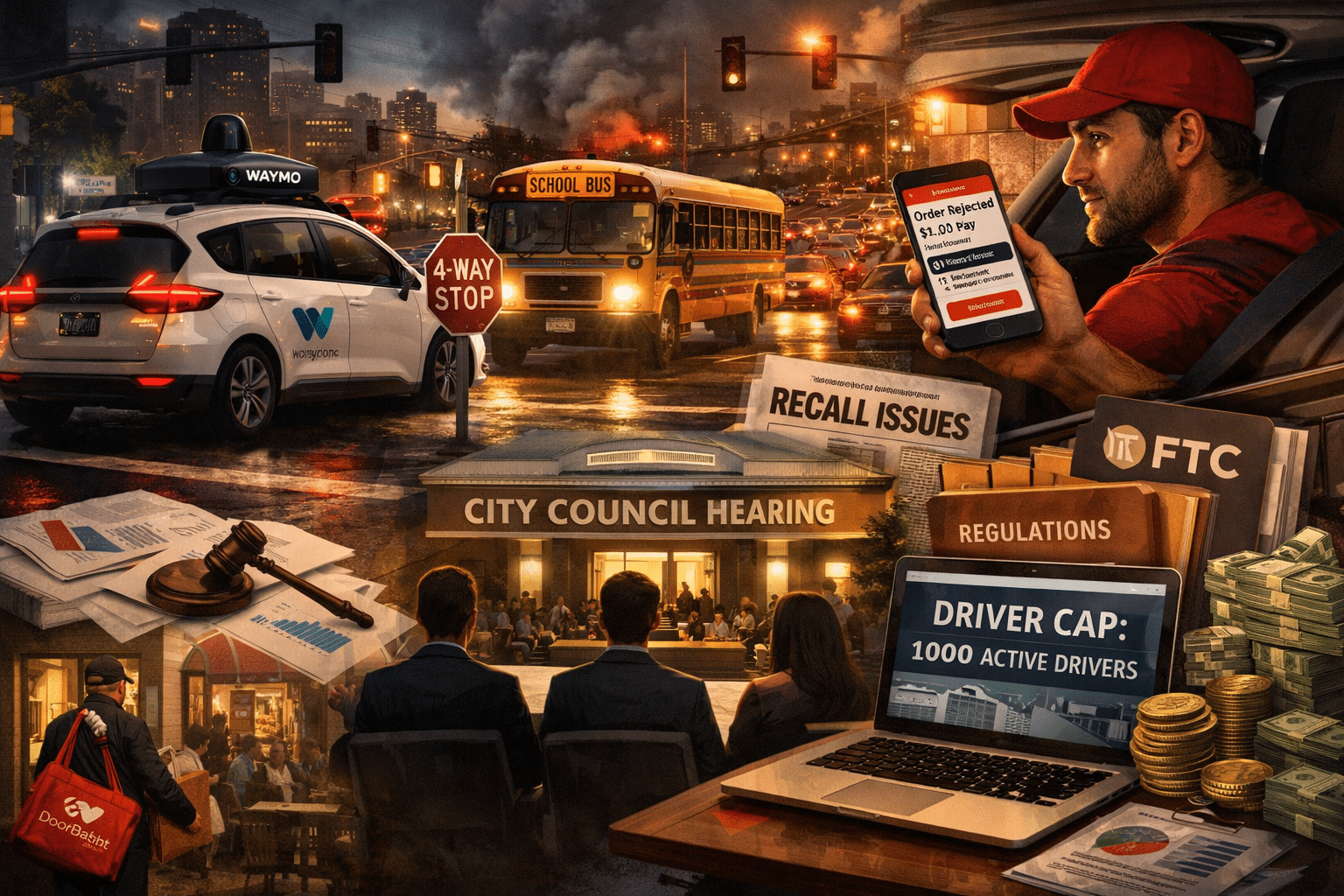by Jason Tieri | Jan 19, 2026 | Podcasts
Everything Gig Economy Podcast Related: https://gigeconomyshow.com/
Download the Audio Podcast: https://thegigeconomypodcast.buzzsprout.com
Love the show? You now have the opportunity to support the show with some great rewards by becoming a Patron. Tier #2 we offer free merch, an Extra in-depth podcast per month, and an NSFW pre-show https://www.patreon.com/thegigeconpodcast
Octopus is a mobile entertainment tablet for your riders. Earn 100.00 per month for having the tablet in your car! No cost for the driver!
https://playoctopus.page.link/HD2FBKJzFqRR35YE9
The Gig Economy Podcast Group Download Telegram 1st, then click on the link to join. https://t.me/joinchat/R42wUR2QGhCi2gBD
TikTok: https://www.tiktok.com/@gigeconomypodcast?
Subscribe on Youtube https://www.youtube.com/channel/UCK_bV7j7o1BzWtB4mt_4R8Q?view_as=subscriber
This podcast is produced by Hey Guys Media Group LLC http://www.heyguysmediagroup.com
Want to start your own podcast? Reach out to them today!

by Jason Tieri | Jan 18, 2026 | Blog
Download the audio podcast!
January in the gig economy hits like a cold front. Demand fades, shoppers hoard routes, and drivers stare at blank screens wondering if the warehouse moved or the app died. We talk about dry January and why it means dry wallets, then get tactical. If you rely on gig income, the only safe move is a multi‑app portfolio: rideshare, food delivery, parcels, and shopping, plus reserve systems where they work. Rates dip and offers vanish, so flexibility becomes strategy. Accepting less for Amazon routes or switching to Instacart for a weekend grocery surge can keep cash flowing. The real lesson is to plan for seasonal troughs, stack savings when December pops, and refuse to depend on one platform.
Misinformation became its own gig. A viral “DoorDash whistleblower” turned out to be AI, and it still lured press, executives, and half the internet. That’s the new landscape: text that looks real and spreads faster than corrections. We discuss how to spot digital tells, why slush‑fund claims smelled off, and why companies must verify before reacting. Then we zoom out to AI’s infrastructure: data centers eating power and pushing local utility rates up. Towns take huge buyouts, neighbors get sticker shock, and Microsoft promises to absorb increases around new facilities. It’s not abstract for drivers; higher electricity hits EV charging, home bills, and warehouse costs that ripple into payouts.
Policy keeps sprinting to catch up. California’s new rule mandating full refunds for wrong or missing orders sounds great until you picture repeat abusers. We like the promise of live human support and fast refunds, but there must be guardrails: limits on serial claims, proof thresholds, and shielding restaurants from fraudulent chargebacks. When customers lie, they don’t hit a faceless app; they punch the cook, the courier, and the margins. The Brooklyn‑style broccoli saga drives home another point: training matters. If a Spark shopper confuses crowns with florets and weighs a nugget at five cents, that’s not just a joke; it’s a systems issue where quality checks and clearer UI could prevent waste and refunds.
Trust and data collide in less obvious ways. Amazon Flex couriers are nudged to install a third‑party safe‑driving app to earn gift cards. We question the bargain: small perks traded for driving telemetry that can mark you as a hard braker in someone’s algorithm. Even if Amazon says it won’t receive the data, aggregators monetize somehow. A driver’s risk profile can outlive a $25 code, and gig workers have learned the hard way that “not affiliated” can evolve. Meanwhile, Uber is building kiosks at airports for travelers without data plans. It’s smart access design: order at a screen, pay, and get a printed receipt with car details. It also reveals an untapped market that still hasn’t tried rideshare, and that means more trips for drivers when systems don’t fail.
Autonomy keeps making headlines, sometimes for the wrong reasons. A Waymo halted on train tracks captured the uncanny valley of safety: machines that promise superhuman perception still make human‑seeming mistakes. Contrast that with Zooks in Las Vegas: no steering wheel, bi‑directional motion, roomy cabins, and permissive rules for food and drink. Seven years of mapping before public launch shows a different posture—slow, careful, and local. On the delivery side, China’s autonomous vans bulldozing through construction and snow shows what happens when speed outruns safety. Packages survive less than sidewalks. If this becomes the norm, regulators and insurers will rewrite the rules before drivers see benefits.
Finally, we unpack New York City’s allegation that Uber Eats and DoorDash redesigned tipping flows to suppress pre‑checkout tips, slicing average tips from $2.17 to $0.76. If accurate, that’s a massive pay cut masked as “UI changes.” Tips shouldn’t be the foundation of pay, but they are. Moving tipping to post‑delivery shifts psychology: fewer taps, more friction, lower earnings. Workers need transparency on payout timing, tip presentation, and minimums that don’t get clawed back by design. There’s a brighter note: Walmart and Wing are scaling drone delivery to reach tens of millions. For suburban logistics, drones could take the low‑weight, high‑frequency runs and free drivers for higher‑value routes. Noise and airspace will be challenges, but the mix of drones, vans, and human couriers might finally balance speed with earnings. Until then, resilience means diversifying, saving through the peaks, and pushing apps—and lawmakers—for fair design.

by Jason Tieri | Jan 12, 2026 | Podcasts
Everything Gig Economy Podcast Related: https://gigeconomyshow.com/
Download the Audio Podcast: https://thegigeconomypodcast.buzzsprout.com
Love the show? You now have the opportunity to support the show with some great rewards by becoming a Patron. Tier #2 we offer free merch, an Extra in-depth podcast per month, and an NSFW pre-show https://www.patreon.com/thegigeconpodcast
Octopus is a mobile entertainment tablet for your riders. Earn 100.00 per month for having the tablet in your car! No cost for the driver!
https://playoctopus.page.link/HD2FBKJzFqRR35YE9
The Gig Economy Podcast Group Download Telegram 1st, then click on the link to join. https://t.me/joinchat/R42wUR2QGhCi2gBD
TikTok: https://www.tiktok.com/@gigeconomypodcast?
Subscribe on Youtube https://www.youtube.com/channel/UCK_bV7j7o1BzWtB4mt_4R8Q?view_as=subscriber
This podcast is produced by Hey Guys Media Group LLC http://www.heyguysmediagroup.com
Want to start your own podcast? Reach out to them today!

by Jason Tieri | Jan 11, 2026 | Blog
Download the show here!
The conversation opens with a ground-level reality check: incentives move behavior, and when they disappear, so does supply. An Uber ride quest paying an extra eight dollars per trip pulled a driver through a slow holiday market, yet similar carrots on Lyft have gone missing for months. Meanwhile, Walmart’s Spark incentives show up almost daily except on New Year’s Eve, when workloads spiked and bonuses mysteriously vanished. That inconsistency leaves drivers weighing dead miles, long returns from small towns, and whether a $30 fare plus a small quest kicker truly beats a day of stacked shop-and-deliver orders. The theme is simple but powerful: on-demand labor follows incentives, and when platforms misalign them, workers don’t show up.
The show’s centerpiece is the DoorDash “desperation score” rumor: a Reddit-claimed internal metric using driver behavior to tune pay. Verified or not, it hits a nerve because algorithmic steering already shapes who sees which orders and at what price. The hosts split the hair between efficiency and exploitation—if a platform routes low-paying offers to drivers who accept anything, is that good operations or a moral breach? The line is blurry. Add in Instacart’s reported price testing and faint political thunder for regulating algorithmic pay, and you get a looming policy question: when does optimization become manipulation? The takeaway lands somewhere pragmatic—capitalism is fine, secrecy is fine, but not if it buries harm to workers.
Operational absurdities keep surfacing. A McDonald’s weighing orders to curb “theft” sounds like rigor until you recognize most missing items are simple errors under time pressure. Still, standard weights for bags could create accountability where audits keep failing. Then there’s consumer behavior: “wrapped” summaries from Uber and others risk backfiring by forcing people to face how often they order delivery. Seeing 130 orders a year, or weekly coffee at full price, jolts habits. Platforms want stickiness, but transparency can drive self-correction, especially as fees and tips push average tickets into the $30–$40 range.
Hardware and partnerships are shifting too. Octopus pivoting to Uber Journey TV points-only for Uber trips drains value for Lyft-heavy drivers and trims the mini-economy of in-car games that once encouraged engagement. It’s a reminder that platform exclusivity rarely benefits workers. On the vehicle side, trucks are quietly becoming Swiss Army knives of gig work: hauling furniture, towing, and oversized deliveries. With many owners logging 10+ hours a week, real margins come down to fuel math and smart routing, particularly as EV bets wobble and battery plants retool toward data-center demand instead of cars.
Automation feels both promising and fragile. A Waymo stopping at a red and then rolling into an illegal right turn underlines how brittle edge-case logic can be. Worse is the stowaway caught in a trunk—proof that autonomy needs physical security checks, door-state verification, and better live monitoring. Trust requires more than clean disengagement charts; it needs safety protocols for the messy human world. That same human mess shows up in petty fraud too, like a delivery driver dragging a bag away by string after snapping a photo. It’s almost comic, until you remember every scam erodes consumer patience and driver credibility.
Finally, discovery itself is becoming an AI product. DoorDash’s Zesty app aims to recommend real places with social proof and chat prompts tuned to mood and context. If it resists pay-to-rank pressure, it could beat the noise of generic review sites by learning taste, not just stars. That’s a useful idea in a market where convenience won, costs spiked, and trust got complicated. The through-line across all these stories is alignment: incentives that match effort, transparency that informs without shaming, automation that’s secure, and discovery that respects taste over ad spend. When those align, gig work can be both profitable and humane.

by Jason Tieri | Dec 29, 2025 | Blog
Download the show here!
The year’s end brings more than holiday traffic for gig workers; it is exposing where the system bends and breaks. The conversation opens with the surge of Waymo vehicles and a sobering look at autonomy’s readiness for real streets. Recalls over school bus behavior, gridlock during power outages, and odd passing maneuvers reveal a gap between glossy PR and practical safety. If an autonomous car cannot treat a dark intersection like a four-way stop, confidence collapses. That’s not just a tech story; it spills into public trust, regulatory scrutiny, and insurance realities. The panel argues that self-insured fleets, guarded data, and courtroom wins over disclosure don’t substitute for robust performance in messy cities where liability is human, not hypothetical.
From there, the topic shifts to an overlooked lever: data. Every rejected $2 order pushed to fifteen drivers costs real money in compute, routing, and marketplace churn. With “Dash Now for all” rolling out, oversaturation may spike, and the cost to process bad orders could rise as markets flood with new on-demand drivers. The proposed remedy is controversial but clear: cap concurrent drivers dynamically. If a city needs 700 active drivers at peak, allow 1,000, not 1,800. Real-time entry would free a spot when someone swaps to another app. Fewer idle vehicles means cleaner data, lower routing overhead, and space to improve base pay. It also cools neighborhood congestion and wins points with city councils sensitive to traffic, emissions, and curb chaos.
Skeptics ask if platforms would pass savings to drivers. The answer may be political as much as economic. 2026 looks like a litigation year, with multi-state actions and FTC scrutiny pushing platforms to show good faith. A cap reduces noise in the marketplace, lowers failed dispatch loops, and signals responsibility to regulators. Meanwhile, waitlists can prevent false hope for new entrants who are unlikely to earn in saturated zones. For part-timers, smarter access—rather than unlimited access—could mean better odds when they actually log on. Hard choices beat a slow drift where nobody wins: customers pay more, restaurants give up margin, drivers chase scraps, and platforms burn trust.
Then comes a real-world pivot: a Boulder restaurant group pulled menus from the big apps and routed ordering through their own sites, while still using DoorDash drivers for fulfillment without handing DoorDash the fees or payment flow. It’s direct ordering with third-party delivery, clear menu pricing, a simple delivery fee paid to drivers, and tipping transparency. Is it scalable? Maybe not everywhere. But in markets where brand loyalty and local culture are strong, it can reset expectations: no mystery markups, better driver pay per trip, and restaurants keeping their margins. If replicated in similar college towns like Ann Arbor, a pattern could form: premium independents reclaim ordering while tapping a flexible driver network for last mile.
Alongside these structural shifts, the path to earnings is evolving. Multi-apping, private ride clients, catering blocks, and B2B deliveries build resilience as single-app dependence fades. The panel is blunt: many drivers who once thrived full-time are working fewer nights or pivoting to higher-value niches. Education matters—understanding your market, hours, and mix. The learning curve is steeper than it looks from social media highlights. Discipline, customer nuance, and vehicle cost control separate sustainable income from burnout. A smarter, leaner network with fewer idle drivers, clearer pricing, and direct-order channels could stabilize an ecosystem that has run hot for too long.
Ultimately, the takeaway is pragmatic. Autonomous vehicles won’t rescue delivery economics soon; the tech still stumbles on basics. The marketplace needs intentional design: fewer wasted pings, better base pay, and credible transparency that restores trust among cities, restaurants, and drivers. Dynamic caps, waitlists, and direct ordering are not silver bullets, but they are tools with leverage. As lawsuits and policy pressure mount, platforms can either let courts force their hand or choose reforms that actually make service better. The gig economy thrives when the flywheel spins cleanly—orders priced fairly, drivers paid reliably, and cities freed from perpetual congestion. That future is possible, but only if we stop pretending the current noise is normal.




